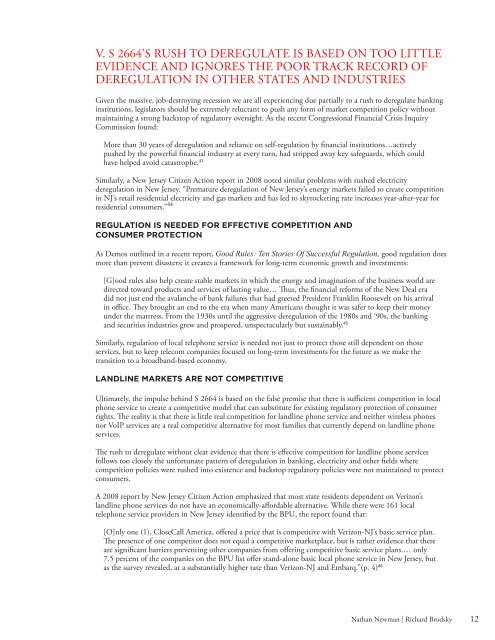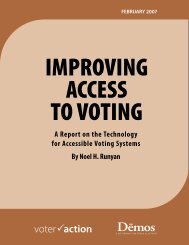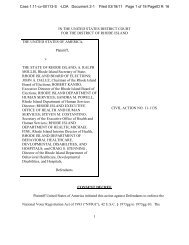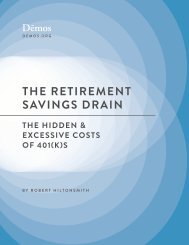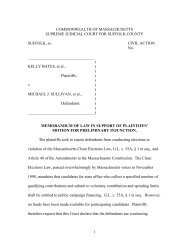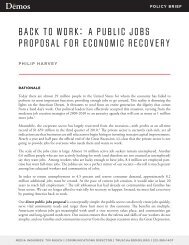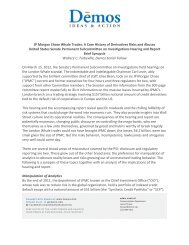how to raise the phone bill of the average new jersey family
how to raise the phone bill of the average new jersey family
how to raise the phone bill of the average new jersey family
- No tags were found...
You also want an ePaper? Increase the reach of your titles
YUMPU automatically turns print PDFs into web optimized ePapers that Google loves.
V. S 2664’S RUSH TO DEREGULATE IS BASED ON TOO LITTLEEVIDENCE AND IGNORES THE POOR TRACK RECORD OFDEREGULATION IN OTHER STATES AND INDUSTRIESGiven <strong>the</strong> massive, job-destroying recession we are all experiencing due partially <strong>to</strong> a rush <strong>to</strong> deregulate bankinginstitutions, legisla<strong>to</strong>rs should be extremely reluctant <strong>to</strong> push any form <strong>of</strong> market competition policy withoutmaintaining a strong backs<strong>to</strong>p <strong>of</strong> regula<strong>to</strong>ry oversight. As <strong>the</strong> recent Congressional Financial Crisis InquiryCommission found:More than 30 years <strong>of</strong> deregulation and reliance on self-regulation by financial institutions…activelypushed by <strong>the</strong> powerful financial industry at every turn, had stripped away key safeguards, which couldhave helped avoid catastrophe. 43Similarly, a New Jersey Citizen Action report in 2008 noted similar problems with rushed electricityderegulation in New Jersey. “Premature deregulation <strong>of</strong> New Jersey’s energy markets failed <strong>to</strong> create competitionin NJ’s retail residential electricity and gas markets and has led <strong>to</strong> skyrocketing rate increases year-after-year forresidential consumers.” 44REGULATION IS NEEDED FOR EFFECTIVE COMPETITION ANDCONSUMER PROTECTIONAs Demos outlined in a recent report, Good Rules: Ten S<strong>to</strong>ries Of Successful Regulation, good regulation doesmore than prevent disasters; it creates a framework for long-term economic growth and investments:[G]ood rules also help create stable markets in which <strong>the</strong> energy and imagination <strong>of</strong> <strong>the</strong> business world aredirected <strong>to</strong>ward products and services <strong>of</strong> lasting value… Thus, <strong>the</strong> financial reforms <strong>of</strong> <strong>the</strong> New Deal eradid not just end <strong>the</strong> avalanche <strong>of</strong> bank failures that had greeted President Franklin Roosevelt on his arrivalin <strong>of</strong>fice. They brought an end <strong>to</strong> <strong>the</strong> era when many Americans thought it was safer <strong>to</strong> keep <strong>the</strong>ir moneyunder <strong>the</strong> mattress. From <strong>the</strong> 1930s until <strong>the</strong> ag gressive deregulation <strong>of</strong> <strong>the</strong> 1980s and ‘90s, <strong>the</strong> bankingand securities industries grew and prospered, unspectacularly but sustainably. 45Similarly, regulation <strong>of</strong> local tele<strong>phone</strong> service is needed not just <strong>to</strong> protect those still dependent on thoseservices, but <strong>to</strong> keep telecom companies focused on long-term investments for <strong>the</strong> future as we make <strong>the</strong>transition <strong>to</strong> a broadband-based economy.LANDLINE MARKETS ARE NOT COMPETITIVEUltimately, <strong>the</strong> impulse behind S 2664 is based on <strong>the</strong> false premise that <strong>the</strong>re is sufficient competition in local<strong>phone</strong> service <strong>to</strong> create a competitive model that can substitute for existing regula<strong>to</strong>ry protection <strong>of</strong> consumerrights. The reality is that <strong>the</strong>re is little real competition for landline <strong>phone</strong> service and nei<strong>the</strong>r wireless <strong>phone</strong>snor VoIP services are a real competitive alternative for most families that currently depend on landline <strong>phone</strong>services.The rush <strong>to</strong> deregulate without clear evidence that <strong>the</strong>re is effective competition for landline <strong>phone</strong> servicesfollows <strong>to</strong>o closely <strong>the</strong> unfortunate pattern <strong>of</strong> deregulation in banking, electricity and o<strong>the</strong>r fields wherecompetition policies were rushed in<strong>to</strong> existence and backs<strong>to</strong>p regula<strong>to</strong>ry policies were not maintained <strong>to</strong> protectconsumers.A 2008 report by New Jersey Citizen Action emphasized that most state residents dependent on Verizon’slandline <strong>phone</strong> services do not have an economically-affordable alternative. While <strong>the</strong>re were 161 localtele<strong>phone</strong> service providers in New Jersey identified by <strong>the</strong> BPU, <strong>the</strong> report found that:[O]nly one (1), CloseCall America, <strong>of</strong>fered a price that is competitive with Verizon-NJ’s basic service plan.The presence <strong>of</strong> one competi<strong>to</strong>r does not equal a competitive marketplace, but is ra<strong>the</strong>r evidence that <strong>the</strong>reare significant barriers preventing o<strong>the</strong>r companies from <strong>of</strong>fering competitive basic service plans.… only7.5 percent <strong>of</strong> <strong>the</strong> companies on <strong>the</strong> BPU list <strong>of</strong>fer stand-alone basic local <strong>phone</strong> service in New Jersey, butas <strong>the</strong> survey revealed, at a substantially higher rate than Verizon-NJ and Embarq.”(p. 4) 46Nathan Newman | Richard Brodsky 12


